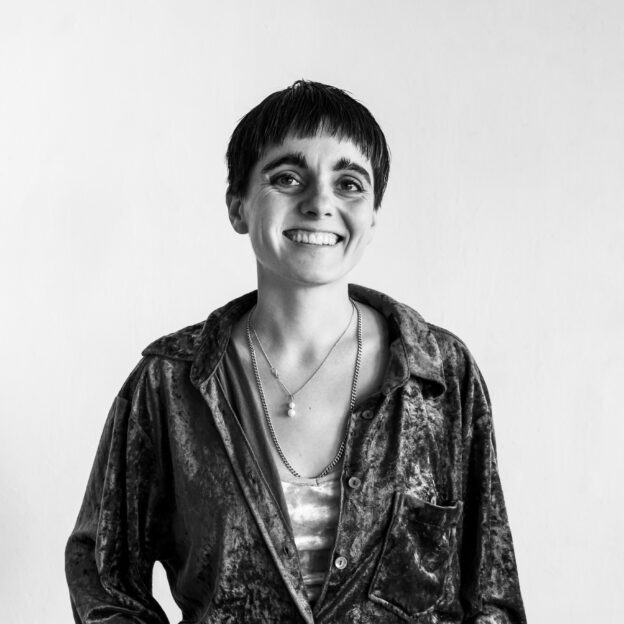Faces shifting, breasts multiplying, hair becoming grass… the bodies in Aura Roig’s paintings are caught in a zone of endless, candy-coloured transformation. In an effort to explore the political and therapeutic possibilities of feminist painting, the Spanish artist paints diaristically, sifting through personal experience and collective trauma to create a surreal iconography of fibre and flesh, where appendages are no more tethered to the principle of naturalism than colours.
Your paintings have a very expressive, contra-abstract quality to them. What informs this stylistic approach?
I like when painting gets close to the style of illustration, because that was everything I was told painting did not have to do. At art school, the worst critique you could get would be that your work was ‘illustrative’, or too rich in detail, or cute. I wanted to step back from this but still find a way to talk about my own biography and life experiences, without it being too much like ‘hey, this is me and my life’. Transforming people into vegetables or objects gives me this distance while still allowing me to talk about personal stuff. For example, with this spaghetti [Aura gestures to a painting of a bowl of spaghetti with a human face]: I was thinking about my grandma, or the idea of the grandma, and how she can devote most of her time, labour, and emotional space to caring for and feeding others.
Is your technique changing with more recent paintings?
Yes, I’m constantly learning new approaches. Even though I studied fine arts, I always avoided the painting classes, so now I’m learning stuff by doing. Finding my way, seeing things, trying them out, then opening a path and following it. Now, for example, I’m playing with the underpainting a lot. It gives a lot of vibration to the image. I like my paintings to be vibrating, with the colours and hidden colours creating all sorts of different contrasts. It means the paintings can call out to people.
Your painting feeling like a beetroot has a visual approach which is almost medieval, like an illumination. Was this a continuation of your autobiographical approach?
That painting was about a moment in my life when I felt I was underground, or wished I was underground. It had less to do with feminism or politics than an emotional, difficult moment with my mental health and environment, which I transformed into this painting.
no images were found
Even your paintings which have the most grotesque or angry subject matter are still executed with a real care and love for their painterly aspects, as though there’s still an impulse to create something beautiful. It’s like how pop songs can disguise painful themes.
Yes, I don’t think the images are less painful because they’re more beautiful. The comparison with pop music is good, because when I was a teenager I was listening more to punk and metal, and my attitude was more punky, more metal, more of a loud scream. These days, I appreciate the magic that a pop song can achieve, when it has strong content but can still approach the masses. It also has to do with embracing what we have been told that femininity is.
Does your conception of femininity differ?
That’s hard to say, because femininity can be very ugly, sold to us by society in pink objects or princesses or cute stuff. When I was young, those things caused me great discomfort. But then I found myself thinking about it—why is pink, which is supposed to be gendered as female, considered the stupid colour, the non-intellectual one, the one that has no academic value? It’s because society considers femininity stupid. In my work, then, I try to adopt or even appropriate these colours and styles and this softness, trying to switch it around. My first exhibition was called Pink is a Sharp Colour.
What are you working on now?
Now, I’m working on a series of eggs. I’m thinking about the meanings of eggs, because they have so many different ones, if you think about them from a feminist perspective or a queer perspective or a care perspective. My current project is on care, and I found these eggs to be a good way of working between all the different things I want to do. I’m making a chicken with a lot of eggs, and I think I’m going to put the faces of all the children of my grandma on them, who are all men and not deconstructed at all.
interview held by Alexander Archer
See and learn more about Aura’s work on her website.
Meet her at the final Show of Round 61: Hidden Portrait – 14. December 2024 @ Ars Avanti, Giesserstrasse 75, 04229 Leipzig

